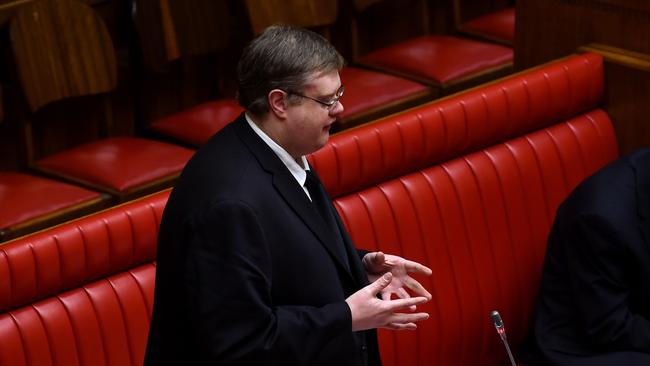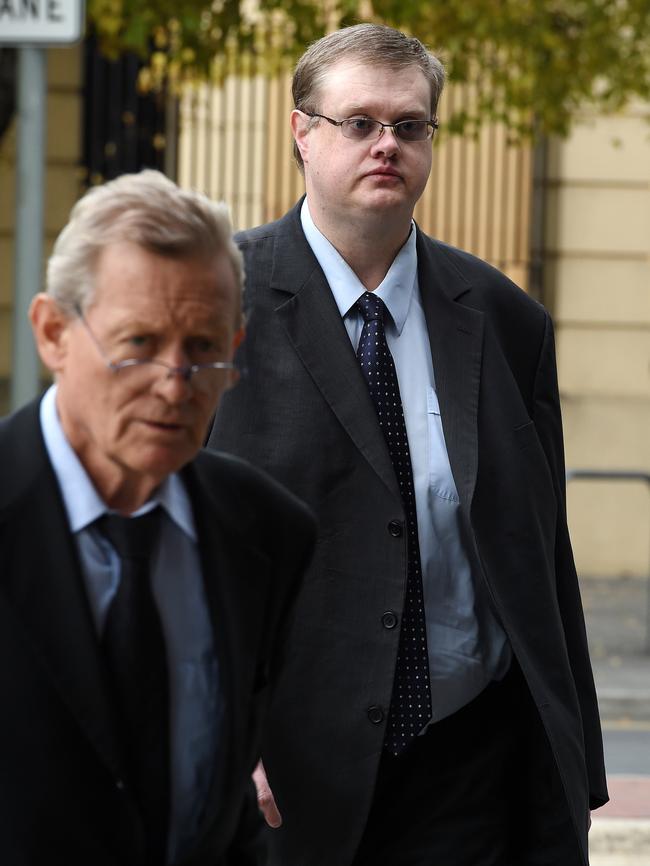SA court to hand down verdict on state MP Bernard Finnigan’s child pornography trial
FORMER State Government police minister Bernard Finnigan today will learn his fate over a long-running court case involving child pornography charges.
IT has spanned more than four years and three jurisdictions, increased in severity, decreased in size, been kept secret, revealed and then suppressed again.
But for all the legal wrangling and political turmoil, the fate of state MP Bernard Finnigan comes down to just three minutes of internet use.
The questions to be answered by the District Court on Tuesday are deceptively simple.
Did Finnigan — former Labor Party heavyweight, former police minister — obtain access to child exploitation material in December 2010 and April 2011?
And did Finnigan — who has earned $695,000 in taxpayer-funded salary since he was charged — also attempt to access other examples of criminal sexual behaviour against children?
They look to be “yes or no” answers, but the reality is the Finnigan case carries the potential to change the criminal law as we know it.
Finnigan’s is considered a test case because it will define what “obtaining access to child exploitation material” actually means, in a legal sense.
Judge Steven Millsteed’s verdict will determine not only how lawyers run future cases, but will make the difference between absolution and conviction for other alleged offenders.

SEISMIC IMPACT
Finnigan, 42, was arrested at his home on April 20, 2011, and charged with possessing and taking steps to access child pornography.
His identity was automatically suppressed under statutes that guarantee anonymity for those charged with child sex offences, but his political affiliation was not.
The arrest could not have come at a worse time for the Labor Government, helmed by a struggling Mike Rann, which was far from popular with the public.
Just hours before his colleague’s arrest, then-Road Safety Minister Tom Kenyon had said “it cannot get any worse” — words that would haunt the party for days to come.
Labor’s approval rating was a rock-bottom 24 per cent and Finnigan’s not-so-secret identity sent further shock waves through a crumbling foundation.
An embattled Mr Rann simultaneously declined to comment on Finnigan while declaring all users of child pornography “sick” and unfit for public office.
Finnigan resigned from Cabinet the day after his arrest but it did little to help.
COURT APPEARANCE
The MP first faced court on May 21, 2011, and, in the months to come, the case shifted and mutated thanks to legal manoeuvring.
In February 2012, prosecutors warned it may be downgraded or dropped, only to triple the number of charges to 12 one month later.
In May, five counts were dropped and Finnigan pleaded not guilty to seven others and argued he had no case to answer.
That tilt failed in September but, with his identity finally public, Finnigan challenged the case in the Supreme Court.
What happened next was unprecedented.
Asked whether prosecutors had met the burden of proof needed to mount a child pornography case against Finnigan, the Full Court bench split three ways.
The only option was to cancel May’s events, order a rehearing and, most ludicrously, reactivate the suppression order.
Then-Chief Magistrate Liz Bolton saw that for the nonsense it was and kept Finnigan’s name in the public eye.
Despite defence counsel’s insistence it would take “the Wisdom of Solomon” to resolve the Full Court’s ruling, Finnigan was ordered to stand trial in April 2015.

FINNIGAN VERSUS GOOGLE
One secret remained — the search terms Finnigan had allegedly used.
Prosecutor Mark Norman, SC, described them as “specific and unambiguously to do with child sex”, dubbing claims the MP had been looking for adult pornography to be “nonsense”.
“In fairness to the accused, he certainly did not spend hours ... it was probably about three minutes, yet he still had plenty of time to see and realise what was on the screen,” he said.
Mr Norman also defined “obtaining access” as simply viewing child pornography.
Michael Abbott, QC, for Finnigan, said it was far more complicated a matter.
He said his client’s admitted regular use of legal, adult pornography left him susceptible to unwanted “pop-ups” and automatic URL redirections.
Mr Abbott also argued Google was more likely to place child exploitation hyperlinks in front of Finnigan given his browser history.
If the prosecution definition was accepted, Mr Abbott warned, many more people would face charges for situations over which they had no control.
On Tuesday, Judge Steven Millsteed will choose one of those two definitions and, by doing so, will rule whether Finnigan is guilty or not guilty.
Whatever his decision, and quite apart from any political fallout, it is unlikely the verdict will end the controversy.
Judge Millsteed heard the trial in the absence of a jury, meaning both defence and prosecution have the right to seek to challenge his verdict in the Court of Criminal Appeal.
The four years and seven months consumed by the case so far may, in the final analysis, prove to be no more than its first chapter.
